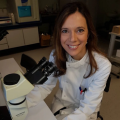
Causes and consequences of aneuploidy in human pluripotent stem cells:implications for early development and regenerative medicine Professor Ivana Barbaric (University of Sheffield) presents her work on biology of pluripotent stem cells and their applications in regenerative medicine and disease modelling. Hosted by Prof Dave Kent.
Event details
Abstract
Humanpluripotent stem cells (hPSCs) represent powerful tools for modelling early human embryogenesis and provide a source of differentiated cells for use in regenerative medicine. The assurance of genetic stability is essential for uses of hPSCs in basic research and regenerative medicine. Nonetheless, hPSCs are known to acquire non-random genetic changes, including recurrent aneuploidies. Some of the acquired genetic aberrations that are associated with the selective growth advantage of variant hPSCs are known to be associated with oncogenesis in other situations, raising the concern that they may also confer tumorigenic or malignant properties on either transplanted differentiated cells or left-over undifferentiated hPSCs. Moreover, genetic changes in hPSCs could also impact basic research because the experimental manipulation of aneuploid hPSCs possessing aberrant proliferation rates or varying differentiation abilities may generate unpredictable results, rendering hPSC-based disease modelling, and developmental studies unreliable.
In our work we are elucidating the molecular mechanisms that underlie the maintenance of the integrity of the hPSC genome, and how disruption of these mechanisms can lead to undesired genetic changes. We are also studying the functional effects of aneuploidy on the behavior of hPSCs in vitro. Our recent work has demonstrated that the dominance of aneuploid hPSCs in mosaic cultures is enhanced through competitive interactions resulting in elimination of wild-type cells, akin to the cell competition behavior described in other cell and developmental models. Understanding of the causes and consequences of aneuploidy in hPSCs will help inform approaches to minimise their occurrence in hPSC cultures destined for clinical or research use. These insights may be also pertinent to assisted conception efforts and may open new therapeutic approaches to target aneuploid cells in cancer.
About the speaker

Professor Ivana Barbaric
Ivana Barbaric completed her DPhil at the University of Oxford in 2006. She then joined Professor Peter Andrews’ group at the University of Sheffield to study the mechanisms that underlie human pluripotent stem cell fate. In 2013, Ivana was awarded a Wellcome Trust discipline hopping fellowship to engineer controlled microenvironments in order to understand mechanical and chemical cues influencing stem cell fate. She was appointed to a Group Leader position at the Centre for Stem Cell Biology, University of Sheffield in 2014. Her research is focused on investigating the causes and consequences of genetic changes in human pluripotent stem cells (hPSCs), and studying how signals from the stem cells microenvironment affect their fate decisions and patterning. Her group is also developing protocols for production of differentiated cells from hPSCs for uses in regenerative medicine.